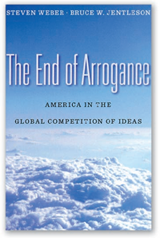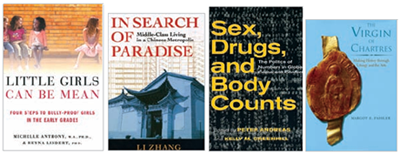The End of Arrogance by Steven Weber and Bruce W. Jentleson '73, PhD '83 (Harvard)
The End of Arrogance

by Steven Weber and Bruce W. Jentleson '73, PhD '83 (Harvard)
Core questions about how best to achieve world order and what constitutes just societies, seemingly settled at the end of the twentieth century, have been reopened in the twenty-first century," say Jentleson, a professor of public policy at Duke, and his co-author. They argue that if America turns away from policies that carry with them a strong sense of entitlement, real and meaningful influence will grow. They recommend a "strategy for world order that rests on mutuality, recognizing that in twenty-first century world politics everyone bargains with everyone and no one is entitled to set the rules."

Little Girls Can Be Mean by Michelle Anthony and Reyna Lindert '94 (St. Martin's). Girls' aggression often takes verbal form—cruel words, exclusion, backstabbing, and rumor spreading—and can be as painful to its victims as physical blows, and more lasting in its effects. "Friendship struggles, relational aggression, and girl bullying take their toll," argue the founders of Wide-Eyed Learning, "and continue unaddressed, at least in part from the fact that these issues are so 'hidden' in girl culture that adults often don't even know they are happening." They outline a four-step plan that shows parents how to help their daughters stand up to such behaviors.
In Search of Paradise by Li Zhang, PhD '98 (Cornell). Home ownership in China is experiencing explosive growth. "No longer seeking happiness and fulfillment through collective sacrifice and socialist ideals, [the middle classes] now hope to create a good life of material comfort and social distinction in the newly constructed gated communities," writes Zhang, a professor of anthropology at UC Davis. "In less than two decades, China has changed from a predominantly public housing regime to a country with one of the highest private homeowner-ship rates in the world. The quest for the good life is profoundly transforming the physical and social landscapes of urban China."
Sex, Drugs, and Body Counts edited by Peter Andreas, PhD '99, and Kelly M. Greenhill (Cornell). Although numbers pervade politics, few policymakers, journalists, scholars, or members of the public sufficiently question their source or challenge their accuracy. "Statistics— both good and bad—are often uncritically accepted and reproduced because they are assumed to have been generated by experts who possess specialized knowledge and who know what they are doing." Andreas, an associate professor of political science at Brown, and his coauthors do not reject the politics of numbers, but argue instead for a more careful and skeptical discussion.
The Virgin of Chartres by Margot E. Fassler, PhD '83 (Yale). "The major industry in Chartres is history," writes Fassler, a professor of music history at Yale. Chartres Cathedral is one of the most important Gothic cathedrals in Europe and is also known as the seat of the Virgin Mary on Earth. Chartres's major relic, a piece of the Virgin Mary's gown, is part of the town's foundational myth from Carolingian times. Fassler traces the interweaving of facts, legends, liturgy, and the arts as the cult of the Virgin developed in the eleventh and twelfth centuries.
Fiction
Tell Us We're Home by Marina Budhos '83 (Atheneum). Jaya, Lola, and Maria seem like typical eighth-graders from a wealthy New Jersey suburb, but with a difference: their mothers works as nannies and maids for the families of their classmates. When anti-immigrant sentiment breaks out after Jaya's mother is accused of stealing, the girls' stable world turns upside down.
Rage Against the Dying Light by Jan Surasky '57 (Sandalwood). A journalist and writing instructor pens a historical novel about Queen Boudicca, the first-century Briton who led her people's resistance against the invading Romans.
Non-Fiction
A Martian Muse by Reginald Shepherd (Michigan). In his final essay collection, the late poet and former instructor in Cornell's English department talks about the craft of poetry and meditates on race, sexuality, and illness.
The Wall Street Professional's Survival Guide by Roy Cohen '77 (Financial Times). Cohen, a career coach and former outplacement counselor at Goldman Sachs, gives up-to-date advice on finding a job during a bear market in the highly competitive financial industry.
Embodying Black Experience by Harvey Young, PhD '04 (Michigan). An associate professor of theatre at Northwestern University examines the ways that black artists, athletes, and performers have confronted racist stereotypes from the early 1800s to the present.
Stories from the Anne Grimes Collection of American Folk Music edited by Sara Grimes '63 et al. (Ohio). In the Fifties, the folksinger, dulcimer player, and scholar Anne Grimes traveled through Ohio collecting and recording traditional music. This book, compiled by her four daughters, includes lyrics and notes about the songs, a CD sampler, and selections from Carl Sandburg and Pete Seeger.
Vernacular Voices by Kirsten Fudeman, PhD '99 (Penn). An assistant professor of French at the University of Pittsburgh examines the role that language played in forming and maintaining Jewish identity in medieval France.
The Evolving Dimensions of International Law by John F. Murphy '59, LLB '62 (Cambridge). A professor of law at Villanova University analyzes the inability of international law to deal with issues regarding peace and security, arms control, non-proliferation, violations of human rights, the environment, and other problems facing the world community.
Constructing the International Economy edited by Rawi Abdelal, PhD '99, Mark Blyth, and Craig Parsons (Cornell). A professor of business administration at Harvard Business School and his co-editors contend that a purely materialist view of political economic theory is untenable and argue that collectively held ideas shape the economic world in which we live.
The Diary of Elizabeth Drinker edited by Elaine Forman Crane '61 (Penn). Elizabeth Drinker kept a journal from 1758 to 1807, and it has been mined for information about the Revolutionary War, the yellow fever epidemic, and race relations in eighteenth-century Philadelphia. Crane, a history professor at Fordham University, argues that few scholars have tried to reveal "the person behind the quill."
Amphibians of East Africa by Alan Channing and Kim Howell '67 (Cornell). Howell, a professor of zoology and marine biology at the University of Dar Es Salaam, and his co-author offer a comprehensive field guide to the 194 frog species and nine caecilians of East Africa.
Objects as History in Twentieth-Century German Art by Peter Chametzky '80 (California). The director of the School of Art and Design at Southern Illinois University, Carbondale, examines how the work of Max Beckman, George Grosz, Joseph Beuys, and other twentieth-century German artists reflects historical events.
Political Themes in the Hebrew Scriptures by Jules Gleicher '68 (Palgrave Macmillan). A professor of political science at Rockford College examines questions of law and justice in the Book of Genesis, Mosaic Law, and the teachings of the prophets.
The Specter of Sex by Sally L. Kitch '67 (SUNY). A professor of women and gender studies at Arizona State University analyzes the connection between gender and race in American history and culture.
The Custom-Fit Workplace by Joan Blades and Nanette Fondas '81 (Jossey Bass). The executive editor of MomsRising.org and her co-author offer strategies to transform work so it enhances people's lives as well as business productivity.
Tales of and About Jewish Youth During the Fin-de-Siècle Era by Lawrence M. Ginsburg '53 (University Press of America). A retired lawyer explores the lives of Jewish youth in Upstate New York during the late nineteenth century.


